#household: moritz
Text
Pine Lake Farewell: Moritz & Davenport
Frank had amazing success in his career, making it big in ballet almost immediately. Nosim who knew him was surprised: Frank’s unquenchable optimism plus ridiculous good luck always resulted in success. His dance club also became the hottest spot in Pine Lake, especially after the grand opening where Charlie Davenport made her big breakthrough.

Charlie moved to the city shortly after the club's opening to pursue full-time songwriting and performing, but visited often to check on her used record shop.

Frank finally persuaded her to go out with him, and they are now married, living in Pine Lake with their son. They both took a break to look after him, which gave Charlie the opportunity to write even more. She plans to get into the recording studio when he's a little older, and then go on tour with the new album. She and Frank talked about having another child, but they’re waiting until after the tour to decide for certain. Simoleons flow like water for the couple, so they donate regularly and generously to music and dance camps for youth.

Eowyn lived happily in the seniors home with her boyfriend, Joshua Ruben, until her relatively early death. She never retired, leaving big shoes to fill in the police department.

Allegra thrived more in her senior years than she ever had in her life. Focused on painting, she started teaching classes for fun, and was a major influence on Jamal Bratford. She and Martin Ruben put past hurts behind them and married, remaining happily so for the rest of their days. Her relationship with Charlie also improved, and though she wished Charlie would visit more, Allegra fully supported her daughter pursuing the career she loved.
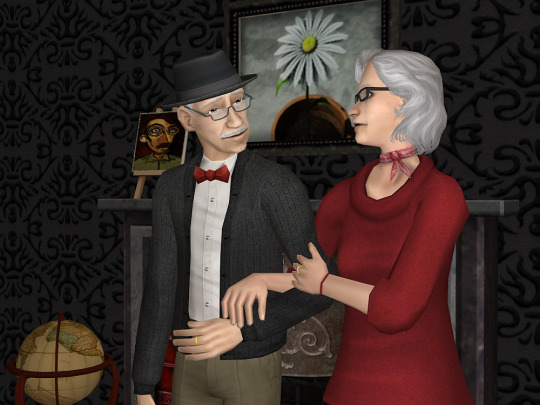
#bacc#pine lake#pine lake farewell#household: moritz#household: davenport#household: seniors home#frank moritz#charlie davenport#eowyn moritz#joshua ruben#allegra gorey#martin ruben#i am honestly still 50/50 on charlie and frank being friends forever or married forever#i went this route because it was easier but i am equally happy with them being excellent influences in each others' separate lives
26 notes
·
View notes
Photo


I forgot to take pictures of all the drama that happened in my game, sooo, here is a recap and the current state.
Moritz showed his weak side and cheated on Cloey with his very first love on a house party. Yvonne got pregnant that night and so did Cloey. Bad bad Moritz.
After this was revealed, Cloey decided to leave Moritz and to take the two kids (Adam and newborn Shila) with her. They got divorced.
Yvonne, her two kids from her previous marriage (yes, she’s also a cheater) and the newborn Marko moved into Moritz household.
On the pictures you can see Shila (daughter of Cloey and Moritz) and Marko (son of Yvonne and Moritz). Moritz’ kids that he got with Cloey visit him frequently to keep up the relationship.
49 notes
·
View notes
Text
Scattered throughout Germany are collections of what look like tiny houses surrounded by well-kept gardens. But people don't live in these small structures with flourishing yards. These are allotment gardens — a take on community gardens also known as Kleingarten or Schrebergarten. Originally developed to facilitate health and wellness, these gardens are described by The Local as a "a concept, a goal, a way of life."
In the early 1800s during a strong period of urbanization when many people had moved to the cities for work, impoverished families often had difficulty finding enough to eat. Some churches, city administrators and factory owners offered to lease them community land for a small fee so that they could grow their own food. These became known as Armengarten, or gardens for the poor, according to DW.com.
As urbanization continued, Dr. Moritz Schreber, a doctor and teacher from Leibzig, was concerned that children raised in the city would suffer both physically and emotionally if they didn't have more outdoor experiences. He proposed the concept of playgrounds where everyone could get physical exercise and enjoy the outdoors. Just a few years after he died, the idea gained traction and the concept of Schrebergarten was named for him, reports the Local.
The early spaces were mostly play areas on the outskirts of town. But families quickly realized there was value in the land and also began planting gardens in their outdoor plots.
While the kids ran around and soaked in all that fresh air, the adults grew vegetables for the family. But there was downtime for them, too. They pulled up their chairs and talked or played cards. The gardens evolved into a hub for relaxation and social life for everyone in the family. The gardens also became known as Kleingarten ("small garden") or Familiengarten ("family garden").
Most of the plots were converted completely to family gardens by World War I, and those plots helped a hungry populace survive both world wars, reports German Girl in America.
As the popularity of the gardens grew, laws were passed to keep leasing fees reasonable. The plots of land were kept in the family, passed down from generation to generation as long as the fees were paid.
Many of the gardens were located in relatively undesirable areas where most people didn't want to live, like along railroad tracks, airports and even on both sides of the Berlin Wall. They were usually grouped together in colonies, forming communities.
A way of life
Though they are no longer a necessity, Kleingarten are now considered a luxury or, some say, a key pillar to a recreational way of life.
These days, there are about 1 million allotment gardens in Germany and 95% of them are occupied, according to a study by the German Institute for Construction, City and Space Research.
The average age of a garden association member is 56, a drop in about five years since 2011.
"The allotment garden system continues to have a permanent place in the green and open space system of cities and fulfills important social, ecological and urban planning functions," the study authors write. "The allotment garden is rejuvenating: the generation change is becoming more noticeable ... The main reason for this is the increased demand from young households, mostly families with children, who are also becoming more international. In the big cities, club members are more often younger than in the smaller cities."
And these younger people appreciate the opportunity to be outdoors.
"Overall, this also reflects an increasing need to become more involved in nature and environmental protection and to use, secure and make green and open spaces, especially in the metropolitan areas, as places of rest and relaxation," the researchers write.
Garden laws and waiting lists
Gardens now are often so much more than just a few veggie plants. They can be elaborate spaces with loads of flowers, water features, barbecue grills and even the occasional garden gnome. They are spots for people to relax and socialize and enjoy the outdoors.
But it's not easy to just grab a plot and start growing. There's often a waiting list. According to the BBC, Berlin's gardens have a waiting list of 12,000 people, and it typically takes at least three years to get a plot.
And as attractive as the gardens might be now, with their colorful flowers and home-like accouterments, there are national laws to control what goes on in the plots. The garden huts can't be too big or used as residences, according to DW.com, and at least one-third of the garden must be used to grow fruits and vegetables.
But for many, the balance of rules versus relaxation is worth it, as generations mingle in the gardens.
"The amount of work that goes into taking care of the garden also makes you appreciate what you're eating — and makes you realize what's in season," Paul Muscat, 32, of Wedding, Germany, tells the BBC. "Except for the parks, there’s no immediate escape from the urban environment. This offers a reprieve from that."
Updated February 22, 2020
2 notes
·
View notes
Text
Frankenstein by Mary Shelley
CHAPTER VI.
Clerval then put the following letter into my hands. It was from my own Elizabeth:—
"My dearest Cousin,
"You have been ill, very ill, and even the constant letters of dear kind Henry are not sufficient to reassure me on your account. You are forbidden to write—to hold a pen; yet one word from you, dear Victor, is necessary to calm our apprehensions. For a long time I have thought that each post would bring this line, and my persuasions have restrained my uncle from undertaking a journey to Ingolstadt. I have prevented his encountering the inconveniences and perhaps dangers of so long a journey; yet how often have I regretted not being able to perform it myself! I figure to myself that the task of attending on your sick bed has devolved on some mercenary old nurse, who could never guess your wishes, nor minister to them with the care and affection of your poor cousin. Yet that is over now: Clerval writes that indeed you are getting better. I eagerly hope that you will confirm this intelligence soon in your own handwriting.
"Get well—and return to us. You will find a happy, cheerful home, and friends who love you dearly. Your father's health is vigorous, and he asks but to see you,—but to be assured that you are well; and not a care will ever cloud his benevolent countenance. How pleased you would be to remark the improvement of our Ernest! He is now sixteen, and full of activity and spirit. He is desirous to be a true Swiss, and to enter into foreign service; but we cannot part with him, at least until his elder brother return to us. My uncle is not pleased with the idea of a military career in a distant country; but Ernest never had your powers of application. He looks upon study as an odious fetter;—his time is spent in the open air, climbing the hills or rowing on the lake. I fear that he will become an idler, unless we yield the point, and permit him to enter on the profession which he has selected.
"Little alteration, except the growth of our dear children, has taken place since you left us. The blue lake, and snow-clad mountains, they never change;—and I think our placid home, and our contented hearts are regulated by the same immutable laws. My trifling occupations take up my time and amuse me, and I am rewarded for any exertions by seeing none but happy, kind faces around me. Since you left us, but one change has taken place in our little household. Do you remember on what occasion Justine Moritz entered our family? Probably you do not; I will relate her history, therefore, in a few words. Madame Moritz, her mother, was a widow with four children, of whom Justine was the third. This girl had always been the favourite of her father; but, through a strange perversity, her mother could not endure her, and, after the death of M. Moritz, treated her very ill. My aunt observed this; and, when Justine was twelve years of age, prevailed on her mother to allow her to live at our house. The republican institutions of our country have produced simpler and happier manners than those which prevail in the great monarchies that surround it. Hence there is less distinction between the several classes of its inhabitants; and the lower orders, being neither so poor nor so despised, their manners are more refined and moral. A servant in Geneva does not mean the same thing as a servant in France and England. Justine, thus received in our family, learned the duties of a servant; a condition which, in our fortunate country, does not include the idea of ignorance, and a sacrifice of the dignity of a human being.
"Justine, you may remember, was a great favourite of yours; and I recollect you once remarked, that if you were in an ill-humour, one glance from Justine could dissipate it, for the same reason that Ariosto gives concerning the beauty of Angelica—she looked so frank-hearted and happy. My aunt conceived a great attachment for her, by which she was induced to give her an education superior to that which she had at first intended. This benefit was fully repaid; Justine was the most grateful little creature in the world: I do not mean that she made any professions; I never heard one pass her lips; but you could see by her eyes that she almost adored her protectress. Although her disposition was gay, and in many respects inconsiderate, yet she paid the greatest attention to every gesture of my aunt. She thought her the model of all excellence, and endeavoured to imitate her phraseology and manners, so that even now she often reminds me of her.
"When my dearest aunt died, every one was too much occupied in their own grief to notice poor Justine, who had attended her during her illness with the most anxious affection. Poor Justine was very ill; but other trials were reserved for her.
"One by one, her brothers and sister died; and her mother, with the exception of her neglected daughter, was left childless. The conscience of the woman was troubled; she began to think that the deaths of her favourites was a judgment from heaven to chastise her partiality. She was a Roman catholic; and I believe her confessor confirmed the idea which she had conceived. Accordingly, a few months after your departure for Ingolstadt, Justine was called home by her repentant mother. Poor girl! she wept when she quitted our house; she was much altered since the death of my aunt; grief had given softness and a winning mildness to her manners, which had before been remarkable for vivacity. Nor was her residence at her mother's house of a nature to restore her gaiety. The poor woman was very vacillating in her repentance. She sometimes begged Justine to forgive her unkindness, but much oftener accused her of having caused the deaths of her brothers and sister. Perpetual fretting at length threw Madame Moritz into a decline, which at first increased her irritability, but she is now at peace for ever. She died on the first approach of cold weather, at the beginning of this last winter. Justine has returned to us; and I assure you I love her tenderly. She is very clever and gentle, and extremely pretty; as I mentioned before, her mien and her expressions continually remind me of my dear aunt.
"I must say also a few words to you, my dear cousin, of little darling William. I wish you could see him; he is very tall of his age, with sweet laughing blue eyes, dark eyelashes, and curling hair. When he smiles, two little dimples appear on each cheek, which are rosy with health. He has already had one or two little wives, but Louisa Biron is his favourite, a pretty little girl of five years of age.
"Now, dear Victor, I dare say you wish to be indulged in a little gossip concerning the good people of Geneva. The pretty Miss Mansfield has already received the congratulatory visits on her approaching marriage with a young Englishman, John Melbourne, Esq. Her ugly sister, Manon, married M. Duvillard, the rich banker, last autumn. Your favourite schoolfellow, Louis Manoir, has suffered several misfortunes since the departure of Clerval from Geneva. But he has already recovered his spirits, and is reported to be on the point of marrying a very lively pretty Frenchwoman, Madame Tavernier. She is a widow, and much older than Manoir; but she is very much admired, and a favourite with everybody.
"I have written myself into better spirits, dear cousin; but my anxiety returns upon me as I conclude. Write, dearest Victor,—one line—one word will be a blessing to us. Ten thousand thanks to Henry for his kindness, his affection, and his many letters: we are sincerely grateful. Adieu! my cousin; take care of yourself; and, I entreat you, write!
"Elizabeth Lavenza.
"Geneva, March 18th, 17—."
"Dear, dear Elizabeth!" I exclaimed, when I had read her letter, "I will write instantly, and relieve them from the anxiety they must feel." I wrote, and this exertion greatly fatigued me; but my convalescence had commenced, and proceeded regularly. In another fortnight I was able to leave my chamber.
One of my first duties on my recovery was to introduce Clerval to the several professors of the university. In doing this, I underwent a kind of rough usage, ill befitting the wounds that my mind had sustained. Ever since the fatal night, the end of my labours, and the beginning of my misfortunes, I had conceived a violent antipathy even to the name of natural philosophy. When I was otherwise quite restored to health, the sight of a chemical instrument would renew all the agony of my nervous symptoms. Henry saw this, and had removed all my apparatus from my view. He had also changed my apartment; for he perceived that I had acquired a dislike for the room which had previously been my laboratory. But these cares of Clerval were made of no avail when I visited the professors. M. Waldman inflicted torture when he praised, with kindness and warmth, the astonishing progress I had made in the sciences. He soon perceived that I disliked the subject; but not guessing the real cause, he attributed my feelings to modesty, and changed the subject from my improvement, to the science itself, with a desire, as I evidently saw, of drawing me out. What could I do? He meant to please, and he tormented me. I felt as if he had placed carefully, one by one, in my view those instruments which were to be afterwards used in putting me to a slow and cruel death. I writhed under his words, yet dared not exhibit the pain I felt. Clerval, whose eyes and feelings were always quick in discerning the sensations of others, declined the subject, alleging, in excuse, his total ignorance; and the conversation took a more general turn. I thanked my friend from my heart, but I did not speak. I saw plainly that he was surprised, but he never attempted to draw my secret from me; and although I loved him with a mixture of affection and reverence that knew no bounds, yet I could never persuade myself to confide to him that event which was so often present to my recollection, but which I feared the detail to another would only impress more deeply.
M. Krempe was not equally docile; and in my condition at that time, of almost insupportable sensitiveness, his harsh blunt encomiums gave me even more pain than the benevolent approbation of M. Waldman. "D—n the fellow!" cried he; "why, M. Clerval, I assure you he has outstript us all. Ay, stare if you please; but it is nevertheless true. A youngster who, but a few years ago, believed in Cornelius Agrippa as firmly as in the gospel, has now set himself at the head of the university; and if he is not soon pulled down, we shall all be out of countenance.—Ay, ay," continued he, observing my face expressive of suffering, "M. Frankenstein is modest; an excellent quality in a young man. Young men should be diffident of themselves, you know, M. Clerval: I was myself when young; but that wears out in a very short time."
M. Krempe had now commenced an eulogy on himself, which happily turned the conversation from a subject that was so annoying to me.
Clerval had never sympathised in my tastes for natural science; and his literary pursuits differed wholly from those which had occupied me. He came to the university with the design of making himself complete master of the oriental languages, as thus he should open a field for the plan of life he had marked out for himself. Resolved to pursue no inglorious career, he turned his eyes toward the East, as affording scope for his spirit of enterprise. The Persian, Arabic, and Sanscrit languages engaged his attention, and I was easily induced to enter on the same studies. Idleness had ever been irksome to me, and now that I wished to fly from reflection, and hated my former studies, I felt great relief in being the fellow-pupil with my friend, and found not only instruction but consolation in the works of the orientalists. I did not, like him, attempt a critical knowledge of their dialects, for I did not contemplate making any other use of them than temporary amusement. I read merely to understand their meaning, and they well repaid my labours. Their melancholy is soothing, and their joy elevating, to a degree I never experienced in studying the authors of any other country. When you read their writings, life appears to consist in a warm sun and a garden of roses,—in the smiles and frowns of a fair enemy, and the fire that consumes your own heart. How different from the manly and heroical poetry of Greece and Rome!
Summer passed away in these occupations, and my return to Geneva was fixed for the latter end of autumn; but being delayed by several accidents, winter and snow arrived, the roads were deemed impassable, and my journey was retarded until the ensuing spring. I felt this delay very bitterly; for I longed to see my native town and my beloved friends. My return had only been delayed so long, from an unwillingness to leave Clerval in a strange place, before he had become acquainted with any of its inhabitants. The winter, however, was spent cheerfully; and although the spring was uncommonly late, when it came its beauty compensated for its dilatoriness.
The month of May had already commenced, and I expected the letter daily which was to fix the date of my departure, when Henry proposed a pedestrian tour in the environs of Ingolstadt, that I might bid a personal farewell to the country I had so long inhabited. I acceded with pleasure to this proposition: I was fond of exercise, and Clerval had always been my favourite companion in the rambles of this nature that I had taken among the scenes of my native country.
We passed a fortnight in these perambulations: my health and spirits had long been restored, and they gained additional strength from the salubrious air I breathed, the natural incidents of our progress, and the conversation of my friend. Study had before secluded me from the intercourse of my fellow-creatures, and rendered me unsocial; but Clerval called forth the better feelings of my heart; he again taught me to love the aspect of nature, and the cheerful faces of children. Excellent friend! how sincerely did you love me, and endeavour to elevate my mind until it was on a level with your own! A selfish pursuit had cramped and narrowed me, until your gentleness and affection warmed and opened my senses; I became the same happy creature who, a few years ago, loved and beloved by all, had no sorrow or care. When happy, inanimate nature had the power of bestowing on me the most delightful sensations. A serene sky and verdant fields filled me with ecstasy. The present season was indeed divine; the flowers of spring bloomed in the hedges, while those of summer were already in bud. I was undisturbed by thoughts which during the preceding year had pressed upon me, notwithstanding my endeavours to throw them off, with an invincible burden.
Henry rejoiced in my gaiety, and sincerely sympathised in my feelings: he exerted himself to amuse me, while he expressed the sensations that filled his soul. The resources of his mind on this occasion were truly astonishing: his conversation was full of imagination; and very often, in imitation of the Persian and Arabic writers, he invented tales of wonderful fancy and passion. At other times he repeated my favourite poems, or drew me out into arguments, which he supported with great ingenuity.
We returned to our college on a Sunday afternoon: the peasants were dancing, and every one we met appeared gay and happy. My own spirits were high, and I bounded along with feelings of unbridled joy and hilarity.
6 notes
·
View notes
Text
The German economy successfully adapted to the cut-off of natural gas from Russia last year, suggesting that Germany could have moved more swiftly to sanction Russia after it invaded Ukraine, according to a paper to be discussed at the Brookings Papers on Economic Activity (BPEA) conference on September 29.
After the invasion in February 2022, German political, business, and labor union leaders debated whether to embargo the import of Russian gas. Germany imported 55% of its gas from Russia at the time. Studies financed by affected business associations and unions warned that an embargo would produce a severe recession—spiking unemployment and a 6-12% plunge in Germany’s gross domestic product (GDP).
Less than two weeks after the invasion, the authors of the current paper, along with other co-authors, forecast a much smaller GDP decline of 1-3% if Germany was cut off from Russian gas.
Before Germany’s leaders acted on an embargo, Russia’s government-owned energy giant, Gazprom, reduced gas flowing through its Nord Stream 1 pipeline by 40% in June 2022 and halted the flow entirely at the end of August, driving natural gas prices to record levels in Europe. (The pipeline was then destroyed by an explosion in September.)
In their latest paper—”The Power of Substitution: The Great German Gas Debate in Retrospect”—the authors note that, despite a 20% drop in gas consumption, Germany’s GDP expanded by 2% in 2022. Its GDP did suffer a brief mini-recession, however, contracting 0.5% in the last quarter of 2022 and 0.1% in the first quarter of this year.
“Overall, while the German economy is stagnating and faces substantial long-run headwinds, the direct economic costs of the end of Russian energy imports proved moderate and manageable,” write Benjamin Moll of the London School of Economics; Moritz Schularick of the Kiel Institute for the World Economy, a research institute in Germany; and Georg Zachmann of Bruegel, a think tank in Belgium.
They attributed Germany’s success in coping with the gas cut-off to a combination of the adaptability of a market-based economy and policies that supported households and businesses while maintaining market price signals.
Instead of capping gas prices, which would have removed the incentive to reduce energy consumption or find alternative energy sources, the German government offset some the burden by providing monthly lump-sum payments to businesses and households, based on past gas consumption rather than current consumption. Also, Germany quickly found alternative sources by tapping into liquefied natural gas terminals in the Netherlands, Belgium, and France.
The authors conclude that, had Germany embargoed Russian gas at the end of March 2022, soon after the invasion, it would have had sufficient gas to get through the following winter. The failure to implement sanctions sooner, they write, “represents a major missed opportunity … to stand up to [Russian President Vladimir] Putin and help avert enormous human suffering in Ukraine.”
The authors write that Germany’s ability to adapt to the cut-off of Russian gas holds important lessons for similar cases in the future, such as China and Taiwan.
“Market economies have a tremendous ability to adapt that we should not underestimate again,” they write.
Download the conference draft
3 notes
·
View notes
Text
with: open starter
where: the pool
when: early evening on the first day
the steam rising from the pool almost cloaks her as she sits on the edge of it, feet dragging back and forth in the warm water. she’s done with skiing for the day, she’s decided, and now she’s in desperate need of some r & r. sure, so this place wasn’t gstaad, or st. moritz or even verbier, but it would do in a pinch. especially considering the fact that it let her escape the astor household christmas ordeal a week early. “hey,” she waves at the figure approaching, shifting slightly to make room on the ledge. “join me? the view’s great. i’ve seen two people topple over on the slopes already.”

15 notes
·
View notes
Text
Don't Mess with the Princess: "In the little box I put a turd of the Queen’s dogs"
Recently, I discovered the memoirs of Sophie von Hannover in the original French; and while I was aware and had read an, in hindsight rather inaccurate, German translation, I wanted to wait until I could get my hands on the real deal to share this amusing episode with you.
Written in 1680–81, at 50 and having grown somewhat wistful after the loss of two of her siblings in one year, Sophie decided to sit down and compose a text recounting her life.
Her memoir consist of often, but not always amusing episodes (such as helping Monsieur, Louis XIV's brother, arrange his jewellery collection while the latter was only dressed in his night attire) and insightful gazes into the strange world of life at different European courts from the point of view of a woman aware and insistent on her status, yet also equipped with a refreshingly no-nonsense attitude, a dash of healthy scepticism and a wry sense of humour even in the face of personal tragedy and turmoil.

Sophie of the Palatinate aged 11 by Gerard van Honthorst, 1641, in the collection of the Detroit Institute of Art. The portrait and the two incidents recounted below seem to date to the same year.
The daughter of the Bohemian "Winter King" Frederick V of the Palatinate and Elizabeth Stuart, daughter of James I, Sophie was born and raised in exile; her father had lost his briefly-held crown during the Thirty Years' War. With her brothers and sisters, of which she, the 12th of 13 children was the youngest to survive, she was raised at Leiden, away from her widowed mother's court at The Hague because, she suspected, "the sight of her guenons and dogs was more agreeable to her than that of us."
After the death of her little brother at around 10 to 11 years and being the only remaining child in the nursery, the household at Leiden was dissolved, and Sophie sent to live with her mother and sisters at The Hague, where her quick wit made her a centre of court life:
[…] The Prince of Taranto [Henri Charles de La Trémoille, 1620–1672] was among them, who avoided me like the plague, having not enough wit to defend himself. Among the others there were Monsieur de Zulestem and Marigné. One of them was Flemish, the natural son of Prince [Frederick] Henry of Orange, and his taunts were not very polite. One day, I found them too familiar, and in order to avenge myself in the field and to thoroughly wash his head [literal translation of the German phrase jemandem den Kopf waschen, meaning to tell someone off], I wanted to put my handkerchief in a basin from which is was customary for the Queen’s dogs to go to drink. But since there was such a great number of these animals, the basin was to be found empty, and I wetted my handkerchief in a place where the water was not so clear, which I threw in his face. My brother Moritz [1621–c. 1652], who had seen that the Queen’s chamber pot had served for my vengeance, did not hesitate to tell everyone about it in order to increase the mockery, from which the good Fleming found himself much disconcerted. […]
One also wanted to play me another trick on the subject of the son of the Venetian ambassador by the name of Contarini, who was very handsome and who had frequently played with me. There was an Englishman called Vain, who was always teased on account of his great chin. He made a letter in the name of the little Venetian after he had departed and brought it to me to tease a reply from me on grounds of which one might taunt me. I detected his design and to give battle, I gave him a little box in secret wherein I told him was a ring and an accompanying letter from me for the little Venetian. In the little box I put a turd of the Queen’s dogs and in the letter, there was:
To Monsieur the confidant
I give him this present
It is long and it is formed
Like his chin, which is deformed
Sadly, Sophie recalls having been responsible for a number of other shenanigans as well, but overtly states that they were not worthy of being recounted in a memoir. I beg to differ; alas, we can only imagine what else she got up to as a child...
I put the original French, plus the link to the full text below the cut!
The original French:
[…] Le prince de Tarente entre autres estoit de ceux-cy, qui me fuyoit comme la peste, n’ayant assez de vivacité pour se défendre. Parmy les autres il y avoit M. de Zulestem et Marigné. Comme l’un estoit Flamand, fils naturel du prince Henry d’Orange, ses railleries n’estoient pas fort polies. Je les trouvois un jour trop familières, et pour m’en vanger sur le champs et de luy bien mouiller la teste, je voulois mettre pour cela mon mouchoir dans un bassin d’eau oú les chiens de la reine avoient accoustumé d’aller boire. Mais comme le nombre estoit fort grand et ces animaux-là, le bain se trouva vide, et je mouillois mon mouchoir dans un endroit oú l’eau n’estoit pas si claire, que je luy jettois au visage. Mon frère Maurice, qui avoit vu que la chaise percée de la reine avoit servi à ma vengeance, ne manqua pas de le dire à tout le monde, pour rendre la raillerie plus forte, dont le bon Flamand se trouva fort déconcerté.
[…]
On volut encor me faire pièce au sujet du fils de l’ambassadeur de Venise qui s’appelloit Contarini, qui estoit fort joli et qui avoit souvent joué avec moy. Il avoit un Anglois, nommé Vain, qu’on avoit toujours raillé sur son grand menton. Il fit une lettre au nom du petit Vénitien, après qu’il estoit parti, et me l’apporta, pour tirer de moy une réponse dont il auroit pu me railler. Je m’apperceus de son dessein et pour faire la contrebatterie je luy donnois en secret une petite boette oú je luy disois qu’il y avoit une bague que j’accompagnois d’une lettre pour le petit Vénitien. Dans la petite boette j’avois mis une crotte des chiens de la reine, et dans la lettre il y avoit:
Pour Monsieur le confident
Je luy donne ce présent,
Il est long et de la forme
De son menton si déforme
Source:
Köcher, Adolf [Ed.]: Memoiren der Herzogin Sophie nachmals Kurfürstin von Hannover (Publicationen aus den Königlich Preussischen Staatsarchiven vol. 4), Leipzig 1879, p. 36 f.
#sophie von hannover#elizabeth stuart#17th century#memoirs#writing and letters#frederick henry of orange#moritz von der pfalz#philippe ii d'orleans#louis xiv
9 notes
·
View notes
Text

This is a section of the 1860 Iasi Jewish Heads of Household census. It shows a Marcu Sin Meer, whose occupation is "precupet" (huckster, produce seller) The list was compiled by Michael Moritz and comes from a file uploaded to the Iasi Jewish Ancestors group on Facebook.
0 notes
Text
Top 5 Inventions Related to Electricity
1. Electric Motor
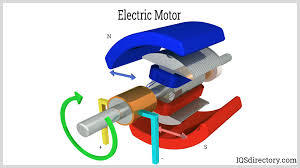
Electric motors are an integral part of modern society, powering everything from household appliances to automobiles. These devices convert electrical energy into mechanical energy, allowing for the efficient operation of a wide range of machinery. But how were electric motors created, and what were the key developments that led to their widespread use today?
Creation
The first electric motors were simple electrostatic devices described in experiments by Scottish monk Andrew Gordon and American experimenter Benjamin Franklin in the 1740s. The theoretical principle behind them, Coulomb's law, was discovered but not published, by Henry Cavendish in 1771. This law was discovered independently by Charles-Augustin de Coulomb in 1785, who published it so that it is now known with his name. Due to the difficulty of generating the high voltages they required, electrostatic motors were never used for practical purposes. But the invention of the electrochemical battery by Alessandro Volta in 1799 made possible the production of persistent electric currents.
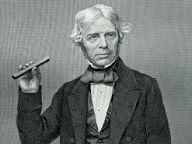
Michael Faraday
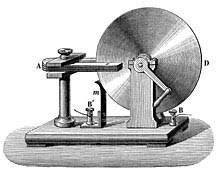
Michael Faraday dynamo
The first steps towards the creation of practical electric motors were taken in the early 19th century. In 1821, Michael Faraday discovered that an electric current could be used to produce a magnetic field. This discovery paved the way for the development of the first electric motors, which used electromagnetic principles to produce motion. Faraday demonstrated the principle of electromagnetic induction, showing that a moving magnetic field could produce an electric current in a wire. This discovery led to the development of the first practical electric generators, which could convert mechanical energy into electrical energy.
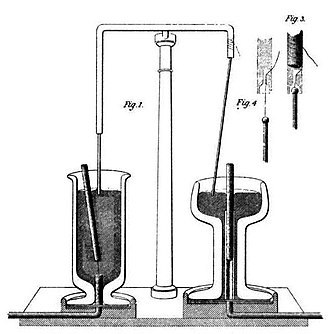
Faraday's electromagnetic experiment, 1821, the first demonstration of the conversion of electrical energy into motion

Ányos Jedlik
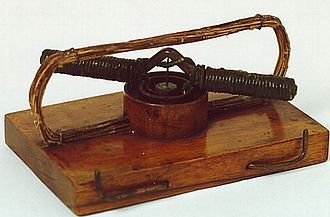
Jedlik's "electromagnetic self-rotor", 1827 (Museum of Applied Arts, Budapest). The historic motor still works perfectly today.
In 1828 Jedlik demonstrated the first device to contain the three main components of practical DC motors: the stator, rotor and commutator. The device employed no permanent magnets, as the magnetic fields of both the stationary and revolving components were produced solely by the currents flowing through their windings.
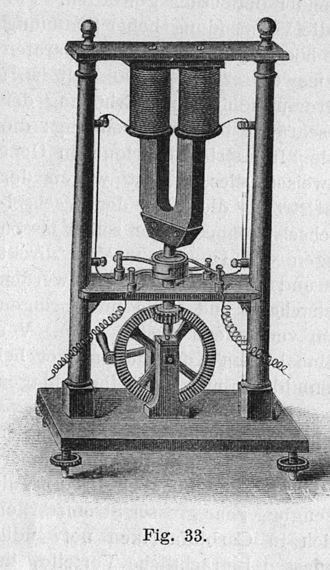
An early form of an alternating current electrical generator built by Pixii
The next major breakthrough in the creation of electric motors came in 1832, when French physicist Hippolyte Pixii developed the first electromagnetic device capable of continuous rotation. This device, known as the Pixii machine, used a rotating magnet to induce an electric current in a stationary coil, producing continuous motion. The first commutator DC electric motor capable of turning machinery was also invented in 1832 by British scientist William Sturgeon.
Other Important Events In Electric Motor
Moritz von Jacobi created the first real rotating electric motor in May 1834.
In 1855, Jedlik built a device using similar principles to those used in his electromagnetic self-rotors that was capable of useful work.
The drum rotor was introduced by Friedrich von Hefner-Alteneck of Siemens & Halske to replace Pacinotti's ring armature in 1872, thus improving the machine efficiency.
The laminated rotor was introduced by Siemens & Halske the following year, achieving reduced iron losses and increased induced voltages.
In 1880, Jonas Wenström provided the rotor with slots for housing the winding, further increasing the efficiency.
In 1873, American inventor Zenobe Gramme developed the first practical DC motor, which used a commutator to produce continuous rotation. This design was highly efficient and quickly became the standard for electric motors in a wide range of applications.
Growth
In 2022, electric motor sales were estimated to be 800 million units, increasing by 10% annually. Electric motors consume ~50% of the world's electricity.
Components
Stator
The stator is the stationary part of the electric motor. It consists of a steel frame, which houses a series of electromagnets. These electromagnets are called stator windings and are made of copper wire. When an electric current flows through the stator windings, they produce a magnetic field.
Rotor
The rotor is the rotating part of the electric motor. It is located inside the stator and is mounted on a shaft. The rotor is made of a series of electromagnets that are arranged in a specific pattern. When the electric current flows through the stator windings, it produces a magnetic field, which interacts with the magnetic field of the rotor, causing it to rotate.
Commutator
The commutator is a component that is located on the rotor shaft. It consists of a series of copper segments that are separated by insulating material. The commutator is responsible for changing the direction of the electric current as the rotor rotates. This is necessary to ensure that the rotor continues to rotate in the same direction.
Brushes
The brushes are components that are located on the stator. They are made of carbon and are in contact with the commutator. The brushes transfer the electric current from the power source to the commutator, which then transfers it to the rotor.
Bearings
The bearings are components that support the rotor shaft and allow it to rotate smoothly. They are usually made of metal and are located at both ends of the motor.
Enclosure
The enclosure is a component that covers the motor and protects it from the environment. It is usually made of metal or plastic and is designed to prevent dust, moisture, and other contaminants from entering the motor.
Advantages
Firstly, electric motors are incredibly efficient. Unlike internal combustion engines, which convert only around 20% of the energy stored in fuel into motion, electric motors are much more efficient. In fact, they can convert up to 90% of the electrical energy they receive into mechanical energy. This means that they are much more energy-efficient, resulting in lower energy costs and reduced carbon emissions.
Secondly, electric motors are extremely reliable. They have fewer moving parts than internal combustion engines, which means that there are fewer parts that can wear out or break down. This translates to lower maintenance costs and fewer breakdowns, making electric motors a more cost-effective option in the long run.
Thirdly, electric motors are much quieter than internal combustion engines. This is because they produce less noise and vibration during operation. This makes them ideal for use in a wide range of applications, from electric cars to household appliances, where noise pollution is a concern.
Fourthly, electric motors are much more environmentally friendly than internal combustion engines. As they produce no emissions during operation, they have no negative impact on the environment. This makes them ideal for use in a range of industries, from transport to manufacturing, where environmental concerns are a key consideration.
Finally, electric motors are versatile and can be used in a wide range of applications. They are used in everything from electric cars to industrial machinery and household appliances, and their adaptability means that they are likely to be used in many more applications in the future.
2. Electric Light Bulb

The invention of the electric light bulb is one of the most important developments in modern history. The ability to produce light without relying on flames or other hazardous materials revolutionized the way we live and work. The creation of the electric light bulb was a long and arduous process, with many scientists and inventors contributing to its development over the years.
Creation
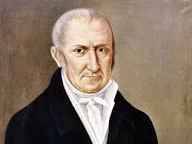
Alessandro Volta
The story of the electric light bulb begins in the early 1800s, with the invention of the electric battery by Alessandro Volta. This invention made it possible to store and use electricity in new and innovative ways, and many scientists and inventors began to experiment with its applications.

Sir Humphry Davy
One of the early pioneers of electric light was Sir Humphry Davy, who in the early 1800s demonstrated the incandescent light, where a wire heated by an electric current produced light. However, this design was not practical for everyday use as the wire would quickly burn out.

It wasn't until the late 1800s that Thomas Edison was able to develop a commercially viable electric light bulb. Edison began experimenting with electric lighting in the 1870s, and by 1879 he had developed a carbon filament that was capable of withstanding the heat and producing light for an extended period of time. Edison's breakthrough came through his development of a vacuum pump that could remove air from the bulb, which greatly reduced the amount of heat and prevented the filament from burning out. He also experimented with different materials for the filament, finally settling on carbonized bamboo.
Edison's first public demonstration of his electric light bulb took place in December of 1879, and it quickly became clear that this invention was going to change the world. Edison founded the Edison Electric Light Company and began installing electric lighting systems in homes, businesses, and public spaces around the country.
Growth
The electric light bulb was a major breakthrough in human history, paving the way for many other technological developments. With the ability to produce light on demand, people could work and play long into the night, and entire industries were created around the production and distribution of electricity. Today, the electric light bulb is still an essential part of modern life, although it has evolved significantly since its early days. Modern LED bulbs are much more efficient and long-lasting than Edison's original design, and they are used in everything from streetlights to smartphones.
3. Electric Battery

The electric battery is a device that converts chemical energy into electrical energy, and it has become an essential component of modern life. From powering our smartphones and laptops to enabling electric cars to run, the electric battery has revolutionized the way we use and consume energy.
Creation

Benjamin Franklin
Benjamin Franklin first used the term "battery" in 1749 when he was doing experiments with electricity using a set of linked Leyden jar capacitors. Franklin grouped a number of the jars into what he described as a "battery", using the military term for weapons functioning together. By multiplying the number of holding vessels, a stronger charge could be stored, and more power would be available on discharge.

Alessandro Volta

Italian physicist Alessandro Volta demonstrating his pile to French emperor Napoleon Bonaparte

A voltaic pile, the first battery
The history of the electric battery dates back to the late 1700s, when Italian physicist Alessandro Volta discovered the principle of the electric cell. Volta's invention consisted of two different metals, typically copper and zinc, which were separated by a moistened piece of cardboard or paper. This simple device, known as the "Voltaic pile," generated a steady stream of electricity.
Volta's invention was soon improved upon by other inventors, including William Cruickshank and John Daniell, who developed more practical batteries. In 1836, John F. Daniell invented the Daniell cell, which used a copper sulfate solution and a zinc electrode to produce electricity. This battery was used extensively in telegraphy, which was the first major application of electricity in communication.

Georges Leclanché
In the late 1800s, another important development in the field of batteries occurred. French engineer Georges Leclanché developed the Leclanché cell, which used a zinc electrode and a manganese dioxide electrode in a solution of ammonium chloride. The Leclanché cell was smaller, more reliable, and less expensive than previous batteries, and it became the standard battery for telegraphy and early electric lighting. In the early 1900s, American inventor Thomas Edison developed the nickel-iron battery, which was used in electric cars and trucks. Edison's battery was durable, rechargeable, and long-lasting, but it was also heavy and expensive, and it ultimately lost out to the lead-acid battery, which was cheaper and easier to manufacture.
Modern Battery
The modern electric battery, which is used in everything from cell phones to electric cars, is a much more sophisticated device than its early predecessors. Modern batteries are made up of many individual cells, each of which contains an anode, a cathode, and an electrolyte. The anode is typically made of lithium or another metal, while the cathode is made of a metal oxide. The electrolyte is a liquid or gel that allows ions to flow between the anode and the cathode.
Growth
Between 2010 and 2018, annual battery demand grew by 30%, reaching a total of 180 GWh in 2018. Conservatively, the growth rate is expected to be maintained at an estimated 25%, culminating in demand reaching 2600 GWh in 2030. In addition, cost reductions are expected to further increase the demand to as much as 3562 GWh.
The development of modern batteries has been driven by a combination of research and development, technological advancements, and market demand. In recent years, there has been a surge of interest in developing new types of batteries that are more efficient, more powerful, and more environmentally friendly.
Chemistry
Electric batteries convert chemical energy into electrical energy by means of a redox reaction. In a redox reaction, one substance is oxidized, losing electrons, while another substance is reduced, gaining electrons. This transfer of electrons creates an electric current, which can be used to power electronic devices. The basic components of an electric battery are an anode, a cathode, and an electrolyte. The anode is the negative electrode, while the cathode is the positive electrode. The electrolyte is a solution or a solid material that allows ions to move between the anode and cathode. When a battery is charged, electrons are removed from the anode and transferred to the cathode through the external circuit. This creates a buildup of positively charged ions at the cathode and negatively charged ions at the anode. When the battery is discharged, the opposite happens, and the ions flow from the cathode to the anode, creating an electric current.
There are many different types of electric batteries, each with its own unique chemistry. The most common type of battery is the lead-acid battery, which is used in cars and other applications. Lead-acid batteries consist of lead dioxide as the positive electrode, lead as the negative electrode, and a sulfuric acid electrolyte. When the battery is charged, lead dioxide is reduced to lead, and lead is oxidized to lead dioxide when the battery is discharged.
Another common type of battery is the lithium-ion battery, which is used in smartphones, laptops, and electric cars. Lithium-ion batteries use lithium cobalt oxide as the positive electrode, graphite as the negative electrode, and a lithium salt electrolyte. When the battery is charged, lithium ions move from the positive electrode to the negative electrode, where they are stored in the graphite. When the battery is discharged, the lithium ions move back to the positive electrode, creating an electric current. Other types of batteries include nickel-cadmium batteries, nickel-metal hydride batteries, and sodium-ion batteries. Each of these batteries has its own unique chemistry, which determines its performance, cost, and environmental impact.
4. Electric Trolley
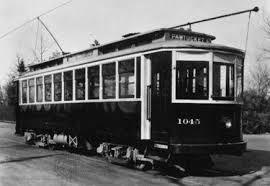
The electric trolley is a revolutionary invention that changed the way people travel in cities. It is a form of public transportation that operates on rails and is powered by electricity. The invention of the electric trolley can be attributed to the efforts of one man, Frank J. Sprague.
Creation
The first working trolley pole was developed and demonstrated by Charles Van Depoele, in autumn 1885 but the use of overhead wire in a system of current collection is reputed to be the 1880 invention of Frank J. Sprague.
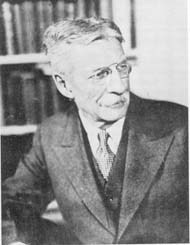
Frank J. Sprague
Frank J. Sprague was born in 1857 in Milford, Connecticut. He was a brilliant inventor and electrical engineer, who made many contributions to the field of electricity. In the late 19th century, he began working on the development of an electric streetcar system, which would be powered by an overhead wire.
Sprague's first electric streetcar system was installed in Richmond, Virginia, in 1888. The system consisted of a single trolley car that was powered by a generator located at the end of the line. The car was equipped with an electric motor, which was connected to the overhead wire by a trolley pole. The trolley pole was a long pole that extended from the roof of the car and made contact with the overhead wire.
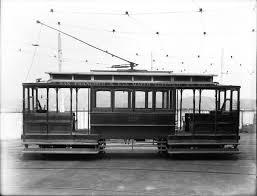
Sprague's system was a great success, and it soon caught the attention of other cities. Over the next few years, Sprague installed electric streetcar systems in several other cities, including Brooklyn, New York; Chicago, Illinois; and Boston, Massachusetts. By 1890, there were over 100 electric streetcar systems operating in the United States.
Advantages
The electric trolley had several advantages over the horse-drawn streetcars that were in use at the time. The electric trolley was faster and more reliable than the horse-drawn streetcar. It was also cleaner, as it did not produce the waste and odor associated with horse-drawn transportation. In addition, the electric trolley was quieter than the horse-drawn streetcar, which made it more pleasant for passengers.
Growth
The electric trolley quickly became a popular form of transportation in many cities. It was used by people from all walks of life, including businessmen, workers, and tourists. The electric trolley helped to make cities more accessible, and it played an important role in the development of urban transportation.
5. Electric Power Grid

The development of the electric power grid was a pivotal moment in the history of electricity. Before the grid was created, electricity was only available to a select few, mainly the wealthy, who could afford their own generators and power plants. However, the power grid changed all that, allowing for electricity to be distributed over long distances and reaching millions of people.
Creation

Nikola Tesla
The idea for the electric power grid was first proposed in the late 19th century by a few pioneering engineers and scientists who saw the potential for electricity to revolutionize society. These early pioneers recognized that if they could develop a system to transmit electricity over long distances, they could bring electricity to homes, businesses, and industries around the world.
One of the key figures in the development of the electric power grid was Nikola Tesla. Tesla was a Serbian-American inventor, electrical engineer, and physicist who is best known for his work on alternating current (AC) electricity. In the late 1880s, Tesla began working on the design of a system to transmit AC electricity over long distances, and in 1891, he patented the design for the first AC power transmission system. Despite the groundbreaking work of Tesla and other pioneers, the development of the electric power grid was slow at first. The early power grids were small and localized, and they were often owned and operated by private companies or municipalities. It wasn't until the early 20th century that the idea of a national power grid began to take shape.
One of the key drivers of the national power grid was the need to bring electricity to rural areas. In the early 20th century, rural areas were still largely without electricity, and many farmers and rural residents were forced to rely on kerosene lamps and other sources of light and heat. The federal government recognized the need to bring electricity to these areas, and in 1935, President Franklin D. Roosevelt signed the Rural Electrification Act, which provided funding for the construction of electric power lines and other infrastructure in rural areas.
Growth
The construction of the national power grid accelerated in the post-World War II era, as the demand for electricity increased dramatically. The power grid grew in size and complexity, and new technologies were developed to improve the efficiency and reliability of the system. Today, the electric power grid is a vast network of power plants, transmission lines, and distribution networks that stretches across the United States and around the world.
Advantages
The electric power grid has had a profound impact on society, enabling countless technological advancements and improving the quality of life for millions of people. From powering our homes and businesses to fueling the growth of new industries, the electric power grid is a critical part of modern life, and its development stands as a testament to the power of human ingenuity and innovation.
#Top#5#Electricity#Electrical#Inventions#Electronic#Light bulb#Battery#Dynamo#Motor#Nikola Tesla#Benjamin Franklin#Thomas Edison#Best#Creations
1 note
·
View note
Text
Joy in Little-Known Watch Brands
As the hype around household names became overwhelming, some collectors turned to makers like Moritz Grossmann and Furlan Marri.
from NYT > Fashion https://ift.tt/IfiObnV
0 notes
Text
Budget planning worksheet printable

#Budget planning worksheet printable full
#Budget planning worksheet printable free
#Budget planning worksheet printable free
We love the bank account information templates too, but make sure that you keep this somewhere safe.ħ) Free Printable Budget Templates- Blooming Homestead I especially like the budget template for the Bill Payment Checklist- everybody forgets a bill now and again, but the checklist could make those mistakes a thing of the past!
#Budget planning worksheet printable full
Pinch a Little Save a Lot has provided you with a full budget planner that would be extremely helpful when it comes to organizing your family budget. If you want to get additional pages or the planner in different colors, she offers a deluxe version for $10.Ħ) Money Management Essentials – Pinch a Little Save a Lot This is a whole system that you could use to get on top of your finances and prevent you from dealing with so much financial stress down the road.Ībby includes the following in the budget planner: There are: Budget at a Glance, Budget Overview, Debt Tracker, and Monthly Budget Tracker.ĥ) 2022 Budget Planner – Just a Girl and Her BlogĪbby is the organization Queen – so you know that anything she puts together to help organize you is going to be good. We really love the different sheets that are available from Clean and Scentsible as part of this Family Binder Budget set. Not only that, but she lists out a bunch of different expense categories, which makes it unlikely that you will miss any.Ĥ) Family Planner Budgeting Printables – Clean and Scentsible We love the Frugal Fanatic household budget template because it is laid out so simply, which is perfect for when you are first starting out and maybe a bit overwhelmed. She also has some other free printables that would be a good accompaniment, such as a monthly goal to-do list and menu plan.ģ) Monthly Budget Printable Template – Frugal Fanatic We were not at all surprised to see a well-designed budget planner available on there – for free! We are big fans of Alexa’s site and what she puts out into the world so we can tell you her budget binder printables can make a difference in your life! We also have a Budget Binder for sale that includes a debt tracker, expense tracker, and more in addition to this basic budget tracker template!Ģ) Free Printable Budget Planner- Single Moms Income We used this to personally help pay off our debt ($25,000), and it helps us to stay on track now that we are both self-employed and our income has changed dramatically. We put a lot of work into making this the best that it could possibly be to guide you through creating your personal budget. Now, we know a lot of you want a budget template that’s clear and concise so you can pop in your numbers and know if you’re in the black or red at the end of the month!Īnd it’s always better if you can score free printable budget templates, so we got you covered with our Savvy free monthly budgeting printable!
Final Thoughts on Monthly Budget Printablesġ) Simple Monthly Budget Printable (ours!).
25) Printable Monthly Budget Planner – Savor + Savvy.
24) Monthly Budget Worksheet – Ladies Make Money.
23) Zero-Based Budget Template – Moritz Fine Designs.
22) Budget Binder Printables – Families For Financial Freedom.
21) Monthly Budget Planner – BobbiPrintables.
19) Basic Budgeting Free Worksheets – Pretty Providence.
18) Printable Monthly Budget Worksheet – My Frugal Home.
17) Budget Planning Worksheets – Sugar Spice & Glitter.
16) Budget Template Printable – Penny Pinchin’ Mom.
15) Free Printable Budget Binder – Freebie Finding Mom.
14) Paycheck Budgeting Printable – Wendaful Planning.
13) Free Budget Worksheet – Lightroom Presets.
12) Free Printable Budget Worksheets – Printable Crush.
11) Free Budget Printable Binder – Waylos.
10) Free Printable Monthly Budget Sheets & Envelopes – Frugal Mom(eh!).
9) Free Family Budget Printable – A Spectacled Owl.
8) Family Budget Worksheet – A Mom’s Take.
7) Free Printable Budget Templates- Blooming Homestead.
6) Money Management Essentials – Pinch a Little Save a Lot.
5) 2022 Budget Planner – Just a Girl and Her Blog.
4) Family Planner Budgeting Printables – Clean and Scentsible.
3) Monthly Budget Printable Template – Frugal Fanatic.
2) Free Printable Budget Planner- Single Moms Income.
1) Simple Monthly Budget Printable (ours!).

1 note
·
View note
Note
12, 16, 43? <3
I'm so sorry xD this has been in my ask box for a long time 🙈❤
It was for this thing: invasive but general asks . Thank you! 🥰
Here we go.
12. what fictional family best represents your own?
I think there are probably choices that are more fitting but I'm gonna go with the first family that popped into my head - the Weasleys. Strong mom, nerdy dad, more than 2 siblings, household a bit messy 😂😉.
16. what are your top five favorite bands/ artists/ musicians?
That's reall hard...and the answer will probably change when you ask me this again at a different time.
I'll try: 1. Imagine Dragons, 2. Green Day, 3. AnnenMayKantereit, 4. MCR, 5. Alec Benjamin.
There's so many more I really like tho...
43. what books did you grow up with?
Oof :D Many. I'll list a few titles (and I'm thinking about books I read before I was 11 because otherwise it would be too many...). In no particular order and I will forget some.
- "The Little Vampire" books by Angela Sommer-Bodenburg (part of my dna probably)
- Several books by Astrid Lindgren (Pippi is great but Ronja and Emil will have my heart forever)
- "Max and Moritz" by Wilhelm Busch (💀)
- "Friedrich" by Hans-Peter Richter (i will probably not touch this book ever again!)
- "The Letter for the King" by Tonke Dragt (gosh, love! I know you like this book also, I think?)
- "The Little Witch" by Otfried Preußler (content that inspired my child self to write a movie script. My child self failed.)
- "Frederick' by Leo Lionni (love little mice and rats because of Lionni's mouse books probably)
- the Duckburg comics (also part of my dna i guess)
- "The Knickerbocker Gang" books by Thomas Brezina (Everyone likes the Tiger Team or the "???" back then but I loved these kids and was in love with Axel) (i only liked to the "???" later on)
- "The Neverending Story" by Michael Ende (i don't have to tell you that this book is very important ♡)
- "Magic Moon" by the Hohlbeins (I even liked the 2nd part but the 1st one is special to me)
- "Famous Five" books by Enid Blyton (my whole collection is still at our parents' house and I need them in my apartement actually because i miss the Famous Five even though I don't particularly like the storie anymore)
- "Robin Hood", but I don't remember which edition. (It was a ~~grown up one though - I remember that several things about it made me upset 😂 it was a red collector's edition. I learned what the medical procedure of 'bleeding someone' was thanks to this book and I will probably never forget that fact)
- the HP books. (It is what it is. :))
And many others...
You know which books came shortly after I turned 12 lol.
😁👍
Love you. ❤️
#sorry for kinda essay dumping you there at the end but i felt like commenting my choices haha#mwah! :*#about me#asks#thequeerlibrarian
1 note
·
View note
Text






University is next up, but first a brief interlude at Frank's apartment because I had a few pictures thanks to Charlie moving into the spare room. The same spare room that has always existed and definitely was not built solely for Charlie, nope nope nope.

Bonus: Frank fell in love with Charlie on a supposed-to-be-platonic double date, but I was curious how she felt. Dang. This could make for an awkward roommate/business relationship.
20 notes
·
View notes
Photo




- Was machst Du denn schon wieder hier? Du sollst hier nicht–
- Ist doch jetzt völlig egal, Konrad.
#Tatort#soft™. yet brutal#I know Leni will deny it but this pretty much is us branching out into a new nice interest#doesn't matter if we'll never get any more content for it okay#😘#Anna as a crying Tatort lesbian vs Moritz as a crying Tatort gay who did it better like-#can this actor household maybe like chill for a hot second or two jfc always with the crying this family#it's all fun and games with Moritz until the crossover episode comes along and Martina runs off with Matuschek#<< there I made it into an official tag a) in the hope to never reactivate it again and b) so that I can say 'f*ckin' called it' in case I#have to#Tatort*
45 notes
·
View notes
Text
Anyway, NEW THOUGHTS on the Justine Moritz situation!!

What Victor SHOULD HAVE SAID AT LEAST is that Justine, being a servant in the household, could have stolen the locket at any time she wanted, and could have stolen way more valuables besides because she was a servant in the household and presumably had access to them at any time! There is NO REASON for her to have murdered a child for it! If her motive was to murder William for reasons other than robbery, she wouldn’t have taken the locket at all because she would have known having it in her possession would be evidence against her! Whoever did it must have been someone who does not typically have access to the Frankenstein family’s valuables but does have access to Justine’s laundry, or someone who did have access to the Frankenstein family’s valuables and Justine’s laundry and had motive to frame her! Who could that be?

… However because Victor is such a bitchboy who has been awake for more than 24 hours at the point of the trial he doesn’t even say this much.

26 notes
·
View notes